During week 7 of operations, 8 new loans were disbursed, bringing the total active loans to 29. 2 additional loans have been approved and processed, but have not yet been disbursed. One of the clients traveled out of town and the other is still preparing the security deposit and loan insurance payment that must be made prior to disbursement. The credit committee approved 8 loans for disbursement next week.
1 application was not approved by the credit committee due to an issue related to ownership of the plot of land on which the house is located. The plot belonged to the client's late father and has been inherited by the children. There is documentation showing the transfer of title through inheritance, but the title is in the name of the sister of the client, who is married and lives with her family at another location. Property related to inheritance can cause problems and family disputes which could pose a risk to the loan. Had the sister been a guarantor for the loan, we probably would have approved the application. (The application was otherwise acceptable.) In the end, we returned the client's file to the credit officer and asked for a letter from the sister stamped by local government officials and acknowledging that she approves of the work to be done on the house by the client. With that letter, we would feel secure enough to approve the loan at a future credit committee sitting.
The first group of clients who had their loans disbursed in July are in the process of finishing their home improvements. To ensure that MAKAZI BORA loans are used for housing purposes, loans are disbursed at a higher than market interest rate. Prior to disbursement, pre-loan photos are taken of the house and specific parts of the house on which the home improvement is to be done. The client and the credit officer agree on exactly what work is expected with the loan. Within 30 days after disbursement, another credit officer visits the site to see if the work has been completed and takes post-loan photos. If the work was completed according to plan, the interest rate is discounted significantly.
Clients understand the discount principle well. Some of the first group of clients that had their loans disbursed in July have been calling the office to have their loan use verified. They say that they do not want the repayment schedule upon which the loan was disbursed, but want to redeem it to receive a new repayment schedule with the discounted interest rate. That is the whole objective of the mechanism and it should help ensure that Habitat's housing microfinance program results in home improvements.
One client came to the office to ask for leniency on the loan verification process. He received a loan for connecting electricity, but there were some complications from TANESCO (Tanzania Electric Supply Corporation) and the work has not yet been completed. He realizes that his loan may be classified as a diverted loan, because the indicator for verified loan use was that there is electricity in the house. After discussion, we decided not allow leniency in loan use verification, because there are always likely to be various delays, etc., which can quickly give room to excuses for non-completion of work and the collapse of the two-tiered interest rate system that is designed to ensure loans are applied to home improvement purposes. We may give an option of having a second verification after 6 months and adjusting the loan at that time for those who were unable to comply with the initial verification. We want to be fair, while ensuring that the home improvement has been made with the loan.
Promotion started in the wards of Azimio and Mtoni. Because the cost of lending is high and the margin of revenue earned on each loan is very small, the MAKAZI BORA housing microfinance program can only break even and become sustainable by achieving volume. Credit officers who have not had many clients to date are having their operating areas expanded and spending more time in the field on promotion. An additional promotional campaign will start in September, which may include MAKAZI BORA posters at hardware dealers and other strategic locations.
Client businesses have proved interesting. One client provides food for a workers cashew nut processing factory in the area. Several sell kitenge (African cloth worn primarily by women) on credit. Some sell pre-paid cell phone cards, both retail and wholesale. Many have businesses that are located at or near their homes.

HOME BASED BUSINESS: Looking out from a window that one client wishes to repair as part of the work with a MAKAZI BORA loan, one of the client's businesses is visible just outside. The client also sells charcoal from another location. Many clients have multiple small businesses, which increases income and adds security to their household income. (Don't put all your eggs in one basket.)
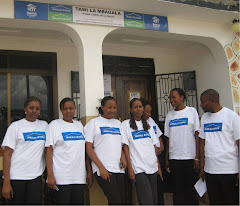
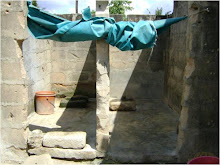

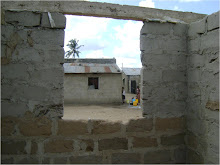
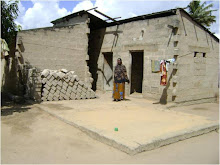
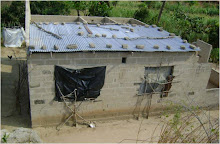
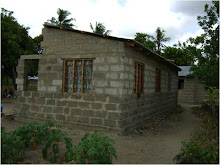

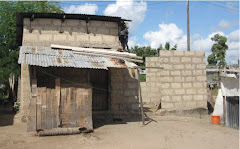






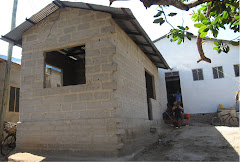.jpg)






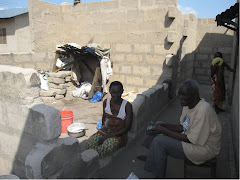
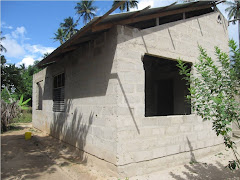

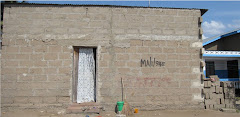

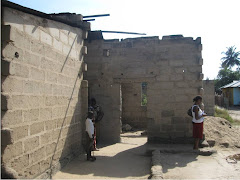













No comments:
Post a Comment